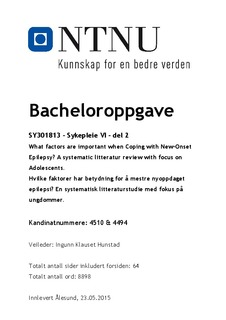| dc.contributor.advisor | Hunstad, Ingunn Klauset | |
| dc.contributor.author | Bjerkvik, Therese Flø | |
| dc.contributor.author | Årsheim, Sandra Nystøl | |
| dc.date.accessioned | 2016-10-21T08:48:09Z | |
| dc.date.available | 2016-10-21T08:48:09Z | |
| dc.date.issued | 2016 | |
| dc.identifier.uri | http://hdl.handle.net/11250/2416826 | |
| dc.description.abstract | Hensikt: Hensikten med bacheloroppgaven var å tilegne oss mer kunnskap om hvordan ungdom med nyoppdaget epilepsi kan mestre diagnosen. | nb_NO |
| dc.description.abstract | Metode: Systematisk litteraturstudie. | nb_NO |
| dc.description.abstract | Resultater: 50% av ungdom med epilepsi opplever stigmatisering fra jevnaldrende og samfunnet. Det kommer fram i teori og forskning at stigmatisering er en stor frykt for disse pasientene, det var grunnlag for hemmeligholdelse av diagnosen. Iverksetting av tidlig tiltak kan forebygge dårlig psykososialt utfall og øke mestringsevnen. Ungdommen selv og andre har manglende kunnskap om diagnosen som førte til risikotaking og dårlig oppfølging av medisinsk behandling. Ungdom med epilepsi hadde større sjanse for dårlig psykososialt utfall, sammenlignet med friske jevnaldrende. God familiedynamikk og støtte fra foresatte var den sterkeste indikasjonen for mestring. | nb_NO |
| dc.description.abstract | Konklusjon: Ved tidlig kartlegging av anfallsutløsende faktorer og hva epileptikeren selv anser som utfordrende, kan terapeutiske tiltak iverksettes. Dette kan øke livskvaliteten, og bidra til mestring og selvstendig håndtering av sykdommen. Ungdom, familien og utenforstående må få undervisning og god informasjon om epilepsi for å kunne hjelpe epileptikeren til mestring. For å oppnå mestring må ungdommen selv være aktivt deltakende ved utarbeiding av tiltak. Via veiledning og undervisning kan sykepleiere påvirke helseatferden til ungdommer med nyoppdaget epilepsi. Økt kunnskap om diagnosen og behandlingen gjorde at ungdommer identifiserte og erkjente anfallsutløsende faktorer og risikofaktorer. | nb_NO |
| dc.description.abstract | Nøkkelbegrep: nyoppdaget epilepsi, ungdom, mestring, sykepleiefaglig tilnærming, opplevelser, holdninger, kunnskap. | nb_NO |
| dc.description.abstract | *** | nb_NO |
| dc.description.abstract | Aim: The aim of the bachelor thesis was to acquire more knowledge about how adolescents with new-onset epilepsy can cope with the disease. | nb_NO |
| dc.description.abstract | Method: A systematic literature review. | nb_NO |
| dc.description.abstract | Result: 50% of adolescents with epilepsy experiences stigmatization by peers or society. Theory and science show that stigma was a great concern; this was the main factors for keeping the disease a secret. Early interventions can prevent poor psychosocial outcome and increase coping skills. It shows that both the adolescents with epilepsy and others have poor knowledge about the disease, which led to risk-taking and poor monitoring of medical treatment. Adolescents with epilepsy had a greater chance for poor psychosocial outcome, compared to healthy peers. Good family dynamics and support from parents was the strongest indication for coping with the disease. | nb_NO |
| dc.description.abstract | Conclusion: Early mapping of seizure triggering factors and what the epileptics themselves consider challenging can therapeutic measures be implemented early. This can increase the quality of life, coping and contribute to an independent management of the disease. Adolescents with epilepsy, their family and outsiders must receive instruction and good information about epilepsy, this can help epileptics to cope. To achieve coping the adolescents must be willing to learn about the disease and actively participate in the development of activities. Through guidance and training can nurses influence health behaviour of adolescents with new-onset epilepsy. Increased knowledge about the disease and treatment lead to identifying and recognize seizure triggers and risk factors. | nb_NO |
| dc.description.abstract | Keywords: New-onset epilepsy, adolescents, coping, nursing approach, experiences, attitude, knowledge. | nb_NO |
| dc.language.iso | nob | nb_NO |
| dc.rights | Navngivelse-Ikkekommersiell-IngenBearbeidelse 3.0 Norge | * |
| dc.rights.uri | http://creativecommons.org/licenses/by-nc-nd/3.0/no/ | * |
| dc.subject | Epilepsi | nb_NO |
| dc.subject | Ungdom | nb_NO |
| dc.subject | Mestring | nb_NO |
| dc.title | What factors are important when Coping with New-Onset Epilepsy? A systematic litteratur review with focus on Adolescents. | nb_NO |
| dc.title.alternative | Hvilke faktorer har betydning for å mestre nyoppdaget epilepsi? En systematisk litteraturstudie med fokus på ungdommer. | nb_NO |
| dc.type | Bachelor thesis | nb_NO |
| dc.subject.nsi | VDP::Medical disciplines: 700::Health sciences: 800 | nb_NO |
| dc.source.pagenumber | 64 | nb_NO |

